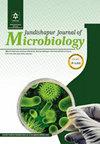Serotypes, Antibiotic Resistance Genes, and Salmonella Pathogenicity Island Genes of Salmonella from Patients in a Hospital in Weifang, China
IF 0.5
4区 医学
Q4 MICROBIOLOGY
引用次数: 0
Abstract
Background: Salmonella is an important foodborne pathogen that causes diarrhea in humans worldwide. Objectives: This study aimed to determine the serotype distribution, antibiotic-resistant genes, and Salmonella pathogenicity island (SPI) genes of clinical isolates of Salmonella in Weifang. Methods: A total of 111 Salmonella strains were collected from Weifang People’s Hospital between 2018 and 2020 and subjected to serotyping using the Kauffmann-White antigen table. Meanwhile, the polymerase chain reaction detected eleven SPI1-6 genes and six antibiotic resistance genes. Results: Among the 111 Salmonella strains, 17 serotypes were identified, with S. Typhimurium, S. Typhi, and S. Enteritidis being the most prevalent. The hilA, ssaB, sseC, marT, siiE, pipB, sopB, and pagN SPI1-6 genes were all found during analysis. The InvA, misL, and siiD genes were detected at 98.2, 97.30, and 97.30% rates, respectively. Also, sul2 and blaTEM were the most prevalent antibiotic resistance genes in this investigation, accounting for 68.47 and 21.62% of the total, respectively. Conclusions: Salmonella isolated from the clinical samples was found to have a diversity of serotypes and possessed various SPI and antibiotic resistance genes.潍坊市某医院患者沙门氏菌血清型、抗生素耐药基因及致病性岛基因分析
背景:沙门氏菌是一种在世界范围内引起人类腹泻的重要食源性病原体。目的:了解潍坊市沙门菌临床分离株的血清型分布、耐药基因及沙门菌致病性岛(SPI)基因。方法:2018 - 2020年在潍坊市人民医院采集沙门氏菌111株,采用Kauffmann-White抗原表进行血清分型。聚合酶链反应检测到11个SPI1-6基因和6个耐药基因。结果:111株沙门菌中检出17种血清型,以鼠伤寒沙门氏菌、伤寒沙门菌和肠炎沙门菌最为常见。在分析中均发现hilA、ssaB、sseC、marT、siiE、pipB、sopB和pagN SPI1-6基因。InvA、misL和siiD基因的检出率分别为98.2%、97.30%和97.30%。sul2和blaTEM是本次调查中最常见的抗生素耐药基因,分别占总数的68.47%和21.62%。结论:临床分离的沙门菌血清型多样,具有多种SPI和耐药基因。
本文章由计算机程序翻译,如有差异,请以英文原文为准。
求助全文
约1分钟内获得全文
求助全文
来源期刊

Jundishapur Journal of Microbiology
MICROBIOLOGY-
CiteScore
1.30
自引率
0.00%
发文量
56
审稿时长
6-12 weeks
期刊介绍:
Jundishapur Journal of Microbiology, (JJM) is the official scientific Monthly publication of Ahvaz Jundishapur University of Medical Sciences. JJM is dedicated to the publication of manuscripts on topics concerning all aspects of microbiology. The topics include medical, veterinary and environmental microbiology, molecular investigations and infectious diseases. Aspects of immunology and epidemiology of infectious diseases are also considered.
 求助内容:
求助内容: 应助结果提醒方式:
应助结果提醒方式:


